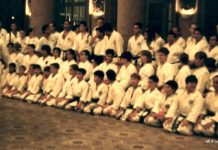Looking for martial arts schools in your area. Visit the Martial Arts Schools Directory
There are many questions to be asked when you are choosing a martial arts school for you or your children and here are a few questions that are not necessarily covered in other articles.
How clean is the dojo is an important question to ask. Recently the mother of a wrestler/bjj student who was just beginning his college careen complained to me that he came home with ring worm and then staph. Don’t be afraid to ask how often a martial arts school cleans the facilities and even more important, their mats. The mats and the facilities need to be cleaned daily with a strong disinfectant that kills bacteria.
When my children began studying martial arts I spent most of my days at the dojo watching them train until I realized that I wanted to train as well. Make sure the school you choose has a waiting area that allows you to watch what is happening in class and even better, allows you to listen to the training that is taking place.
Most martial arts classes begin with exercises and the most important of those is flexibility training. Make sure that the instructor understands how to teach your child to warm up, stretch and cool down when necessary. Avoiding injuries in the dojo is paramount and this leads to the next issue.
Make sure the instructor has you purchase the proper gear for you and/or your children. We recommend having your own gear for health purposes. You will need all or a combination of the following depending on what styles you are practicing: a mouth piece, gloves, headgear, shin and arm pads, a rash guard, ear guards, and the correct uniform. If you are studing jujitsu, bjj or any form of wrestling or grappling make sure the mats are suited to safe practice. Once you know about the equipment, you need to ask the next question, how much contact is allowed.
Martial arts is a contact sport. To learn to defend yourself you need to learn to hit and be hit, kick and be kicked, but how a teacher teaches contact is extremely important. Make sure that the teacher keeps a close eye on the students, especially if they are learning grappling, wrestling and throwing, as injuries can occure quickly if a student does not tapout at the right time, or falls incorrectly. Make sure that you are comfortable with the amount of contact in class and that you understand what will be required as you or your family continue to train.
Inappropriate contact in the martial arts is another issue that needs to be discussed. Martial arts instructors have a great amount of control over their students as they teach them respect and discipline and just like in every other walk of life there are those instructors who will take advantage of their students, especially women and children. Ask to see there credentials, ask who they studied with and look at the character of their instructor(s) and, when possible, contact their instructors for character references. Contact the Better Business Bureau to see if they have any information, positive or negative, about the instructor and the school. See if a background check has been completed on the instructor and talk to other parents who are active at the school, and when possible, talk to people who have studied at that particular school in the past, but are no longer there. Find out why they left.
Also make sure that you or your child will be taught how to talk through situations to avoid confrontation if at all possible. The martial arts school you choose should teach students how to control tempers and egos in a stressful situation so physical contact can be avoided and how to deal with bullying should be part of the curriculum. Adults should be taught about the laws in their state that will affect them if they use their martial arts to defend themselves. Sometimes it is harder to avoid a conflict than it is to fight. Make sure the school believes in training his students to avoid a fight whenever possible! This does not mean that the students will not attend tournaments or use their skills in an arranged manner, controlled by rules and regulations. Martial artists are trained athletes and want to use the skills they learn to test themselves and it is important that what they learn can protect them on the street when necessary.
Looking for martial arts schools in your area. Visit the Martial Arts Schools Directory







